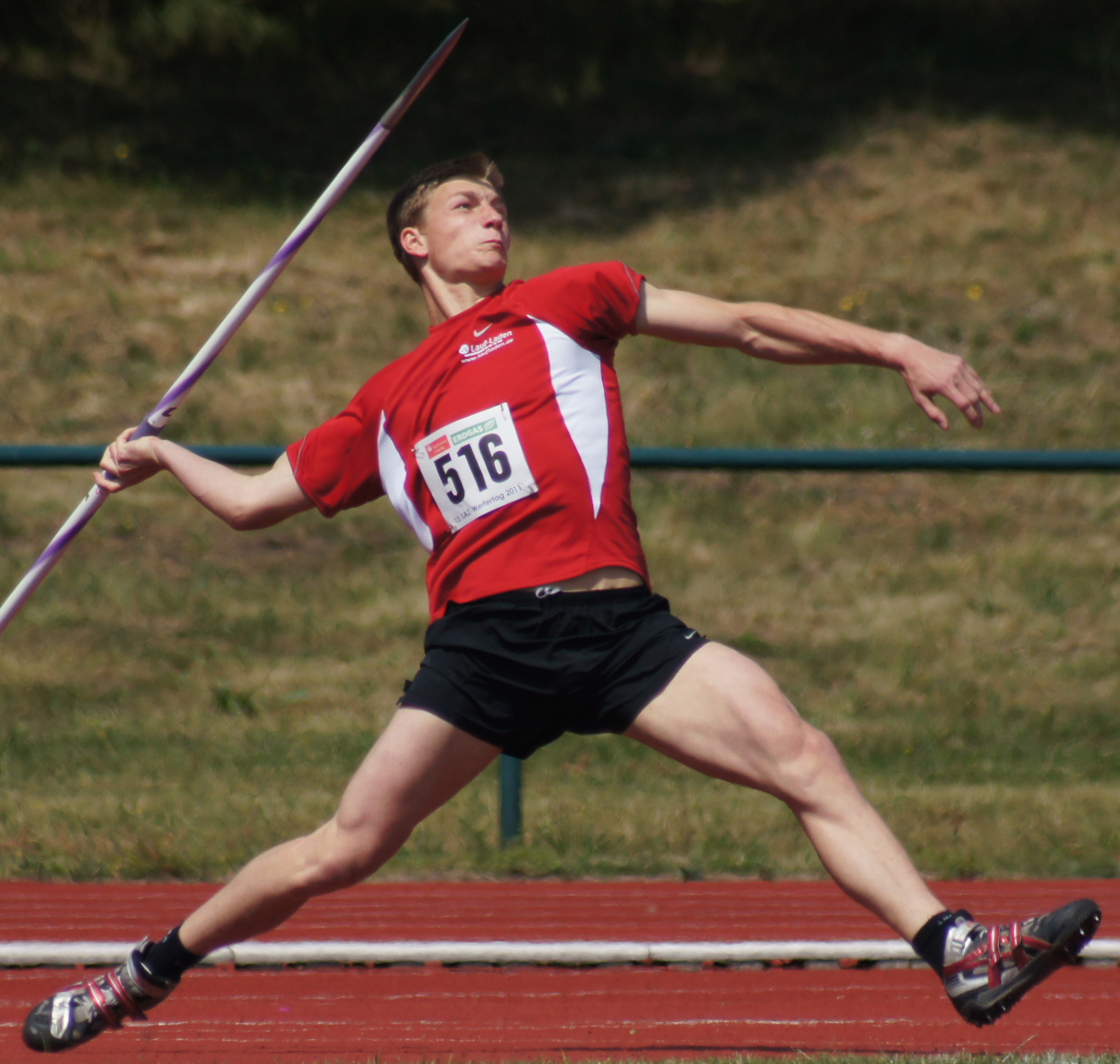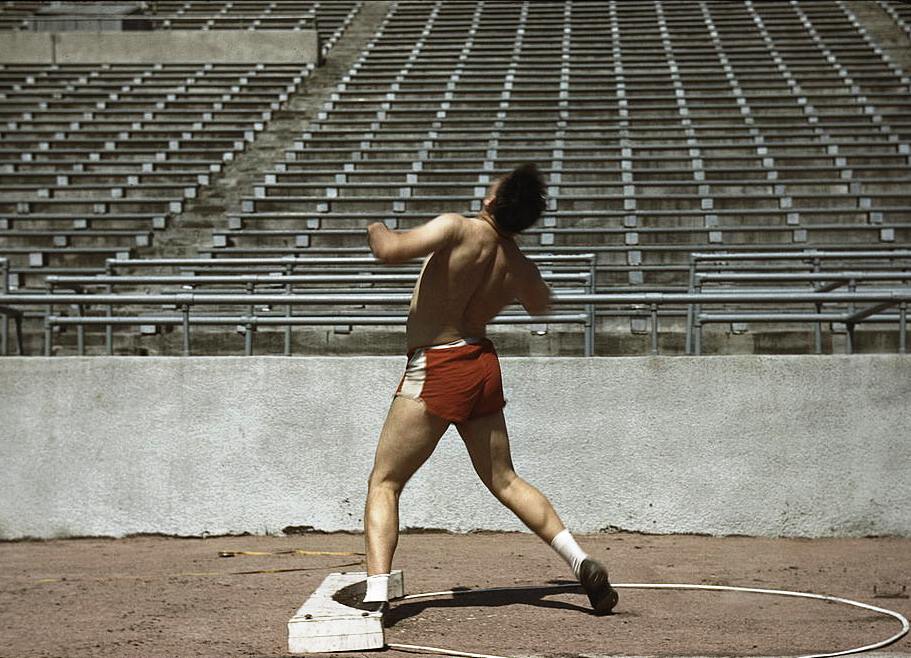|
Nikolay Averyanov (decathlete)
Nikolay Sergeyevich Averyanov (russian: Николай Серге́евич Аверянов; born 4 February 1980 in Chelyabinsk) is a decathlete from Russia, who competed for his native country at the 2004 Summer Olympics in Athens, Greece. He set his personal best score (8048 points) in Tula on 24 June 2004. International competitions Personal bests * 100 metres - 10.65 (2004) * 400 metres - 49.70 (2004) * 1500 metres - 4:26.86 (2004) * 110 metres hurdles - 14.39 (2004) * High jump - 1.97 (2005) * Pole vault - 4.80 (2004) * Long jump - 7.60 (2004) * Shot put - 14.55 (2004) * Discus throw - 41.72 (2004) * Javelin throw - 55.10 (2004) * Decathlon The decathlon is a combined event in Athletics (sport), athletics consisting of ten track and field events. The word "decathlon" was formed, in analogy to the word "pentathlon", from Greek language, Greek δέκα (''déka'', meaning "ten") and ... – 8048 (2004) References * sports-reference 1980 births Living ... [...More Info...] [...Related Items...] OR: [Wikipedia] [Google] [Baidu] |
Chelyabinsk
Chelyabinsk ( rus, Челя́бинск, p=tɕɪˈlʲæbʲɪnsk, a=Ru-Chelyabinsk.ogg; ba, Силәбе, ''Siläbe'') is the administrative center and largest city of Chelyabinsk Oblast, Russia. It is the seventh-largest city in Russia, with a population of over 1.1 million people, and the second-largest city in the Ural Federal District, after Yekaterinburg. Chelyabinsk runs along the Miass River, and is just east of the Ural Mountains. The area of Chelyabinsk contained the ancient settlement of Arkaim, which belonged to the Sintashta culture. In 1736, a fortress by the name of Chelyaba was founded on the site of a Bashkir village. Chelyabinsk was granted town status by 1787. Chelyabinsk began to grow rapidly by the early 20th century as a result of the construction of railway links from the Russian core to Siberia, including the Trans-Siberian Railway. Its population reached 70,000 by 1917. Under the Soviet Union, Chelyabinsk became a major industrial centre durin ... [...More Info...] [...Related Items...] OR: [Wikipedia] [Google] [Baidu] |
110 Metres Hurdles
The 110 metres hurdles, or 110-metre hurdles, is a hurdling track and field event for men. It is included in the athletics programme at the Summer Olympic Games. The female counterpart is the 100 metres hurdles. As part of a racing event, ten hurdles of in height are evenly spaced along a straight course of 110 metres. They are positioned so that they will fall over if bumped into by the runner. Fallen hurdles do not carry a fixed time penalty for the runners, but they have a significant pull-over weight which slows down the run. Like the 100 metres sprint, the 110 metres hurdles begins in the starting blocks. For the 110 m hurdles, the first hurdle is placed after a run-up of 13.72 metres (45 ft) from the starting line. The next nine hurdles are set at a distance of 9.14 metres (30 ft) from each other, and the home stretch from the last hurdle to the finish line is 14.02 metres (46 ft) long. The Olympic Games have included the 11 ... [...More Info...] [...Related Items...] OR: [Wikipedia] [Google] [Baidu] |
Olympic Athletes For Russia
Olympic or Olympics may refer to Sports Competitions * Olympic Games, international multi-sport event held since 1896 ** Summer Olympic Games ** Winter Olympic Games * Ancient Olympic Games, ancient multi-sport event held in Olympia, Greece between 776 BC and 393 AD * Wenlock Olympian Games, a forerunner of the modern Olympic Games, held since 1850 * Olympic (greyhounds), a competition held annually at Brighton & Hove Greyhound Stadium Clubs and teams * Adelaide Olympic FC, a soccer club from Adelaide, South Australia * Fribourg Olympic, a professional basketball club based in Fribourg, Switzerland * Sydney Olympic FC, an Australian soccer club * Olympic Club (Barbacena), a Brazilian football club based in Barbacena, Minas Gerais state * Olympic Mvolyé, a Cameroonian football club based in Mvolyé * Olympic Club (Egypt), a football and sports club based in Alexandria * Blackburn Olympic F.C., an English football club based in Blackburn, Lancashire * Rushall Olym ... [...More Info...] [...Related Items...] OR: [Wikipedia] [Google] [Baidu] |
Russian Decathletes
Russian(s) refers to anything related to Russia, including: *Russians (, ''russkiye''), an ethnic group of the East Slavic peoples, primarily living in Russia and neighboring countries *Rossiyane (), Russian language term for all citizens and people of Russia, regardless of ethnicity *Russophone, Russian-speaking person (, ''russkogovoryashchy'', ''russkoyazychny'') * Russian language, the most widely spoken of the Slavic languages *Russian alphabet * Russian cuisine *Russian culture *Russian studies Russian may also refer to: * Russian dressing *''The Russians'', a book by Hedrick Smith * Russian (comics), fictional Marvel Comics supervillain from ''The Punisher'' series * Russian (solitaire), a card game * "Russians" (song), from the album ''The Dream of the Blue Turtles'' by Sting *"Russian", from the album ''Tubular Bells 2003'' by Mike Oldfield *"Russian", from the album '' '' by Caravan Palace *Nik Russian, the perpetrator of a con committed in 2002 *The South African name f ... [...More Info...] [...Related Items...] OR: [Wikipedia] [Google] [Baidu] |
Athletes From Chelyabinsk
An athlete (also sportsman or sportswoman) is a person who competes in one or more sports that involve physical strength, speed, or endurance. Athletes may be professionals or amateurs. Most professional athletes have particularly well-developed physiques obtained by extensive physical training and strict exercise accompanied by a strict dietary regimen. Definitions The word "athlete" is a romanization of the el, άθλητὴς, ''athlētēs'', one who participates in a contest; from ἄθλος, ''áthlos'' or ἄθλον, ''áthlon'', a contest or feat. The primary definition of "sportsman" according to Webster's ''Third Unabridged Dictionary'' (1960) is, "a person who is active in sports: as (a): one who engages in the sports of the field and especially in hunting or fishing." Physiology Athletes involved in isotonic exercises have an increased mean left ventricular end-diastolic volume and are less likely to be depressed. Due to their strenuous physical activit ... [...More Info...] [...Related Items...] OR: [Wikipedia] [Google] [Baidu] |
Living People
Related categories * :Year of birth missing (living people) / :Year of birth unknown * :Date of birth missing (living people) / :Date of birth unknown * :Place of birth missing (living people) / :Place of birth unknown * :Year of death missing / :Year of death unknown * :Date of death missing / :Date of death unknown * :Place of death missing / :Place of death unknown * :Missing middle or first names See also * :Dead people * :Template:L, which generates this category or death years, and birth year and sort keys. : {{DEFAULTSORT:Living people 21st-century people People by status ... [...More Info...] [...Related Items...] OR: [Wikipedia] [Google] [Baidu] |
1980 Births
__NOTOC__ Year 198 (CXCVIII) was a common year starting on Sunday (link will display the full calendar) of the Julian calendar. At the time, it was known as the Year of the Consulship of Sergius and Gallus (or, less frequently, year 951 ''Ab urbe condita''). The denomination 198 for this year has been used since the early medieval period, when the Anno Domini calendar era became the prevalent method in Europe for naming years. Events By place Roman Empire * January 28 ** Publius Septimius Geta, son of Septimius Severus, receives the title of Caesar. ** Caracalla, son of Septimius Severus, is given the title of Augustus. China *Winter – Battle of Xiapi: The allied armies led by Cao Cao and Liu Bei defeat Lü Bu; afterward Cao Cao has him executed. By topic Religion * Marcus I succeeds Olympianus as Patriarch of Constantinople (until 211). Births * Lu Kai (or Jingfeng), Chinese official and general (d. 269) * Quan Cong, Chinese general and a ... [...More Info...] [...Related Items...] OR: [Wikipedia] [Google] [Baidu] |
Decathlon
The decathlon is a combined event in athletics consisting of ten track and field events. The word "decathlon" was formed, in analogy to the word "pentathlon", from Greek δέκα (''déka'', meaning "ten") and ἄθλος (''áthlos'', or ἄθλον, ''áthlon'', meaning "contest" or “prize”). Events are held over two consecutive days and the winners are determined by the combined performance in all. Performance is judged on a points system in each event, not by the position achieved. The decathlon is contested mainly by male athletes, while female athletes typically compete in the heptathlon. Traditionally, the title of "World's Greatest Athlete" has been given to the person who wins the decathlon. This began when Gustav V of Sweden told Jim Thorpe, "Sir, you are the world's greatest athlete" after Thorpe won the decathlon at the Stockholm Olympics in 1912. The event is similar to the pentathlon held at the ancient Greek Olympics,Waldo E. Sweet, Erich Segal (1987). Sport ... [...More Info...] [...Related Items...] OR: [Wikipedia] [Google] [Baidu] |
Javelin Throw
The javelin throw is a track and field event where the javelin, a spear about in length, is thrown. The javelin thrower gains momentum by running within a predetermined area. Javelin throwing is an event of both the men's decathlon and the women's heptathlon. History The javelin throw was added to the Ancient Olympic Games as part of the pentathlon in 708 BC. It included two events, one for distance and the other for accuracy in hitting a target. The javelin was thrown with the aid of a thong ('' ankyle'' in Greek) that was wound around the middle of the shaft. Athletes held the javelin by the ''ankyle'', and when they released the shaft, the unwinding of the thong gave the javelin a spiral trajectory. Throwing javelin-like poles into targets was revived in Germany and Sweden in the early 1870s. In Sweden, these poles developed into the modern javelin, and throwing them for distance became a common event there and in Finland in the 1880s. The rules continued t ... [...More Info...] [...Related Items...] OR: [Wikipedia] [Google] [Baidu] |
Discus Throw
The discus throw (), also known as disc throw, is a track and field event in which an athlete throws a heavy disc—called a discus—in an attempt to mark a farther distance than their competitors. It is an ancient sport, as demonstrated by the fifth-century-BC Myron statue '' Discobolus''. Although not part of the current pentathlon, it was one of the events of the ancient Greek pentathlon, which can be dated back to at least 708 BC, and it is part of the modern decathlon. History The sport of throwing the discus traces back to it being an event in the original Olympic Games of Ancient Greece. The discus as a sport was resurrected in Magdeburg, Germany, by gymnastics teacher Christian Georg Kohlrausch and his students in the 1870s. Organized men's competition was resumed in the late 19th century, and has been a part of the modern Summer Olympic Games since the first modern competition, the 1896 Summer Olympics. Images of discus throwers figured prominently in advertis ... [...More Info...] [...Related Items...] OR: [Wikipedia] [Google] [Baidu] |
Shot Put
The shot put is a track and field event involving "putting" (throwing) a heavy spherical ball—the ''shot''—as far as possible. The shot put competition for men has been a part of the modern Olympics since their revival in 1896, and women's competition began in 1948. History Homer mentions competitions of rock throwing by soldiers during the Siege of Troy but there is no record of any dead weights being thrown in Greek competitions. The first evidence for stone- or weight-throwing events were in the Scottish Highlands, and date back to approximately the first century. In the 16th century King Henry VIII was noted for his prowess in court competitions of weight and hammer throwing. The first events resembling the modern shot put likely occurred in the Middle Ages when soldiers held competitions in which they hurled cannonballs. Shot put competitions were first recorded in early 19th century Scotland, and were a part of the British Amateur Championships beginning in 18 ... [...More Info...] [...Related Items...] OR: [Wikipedia] [Google] [Baidu] |




